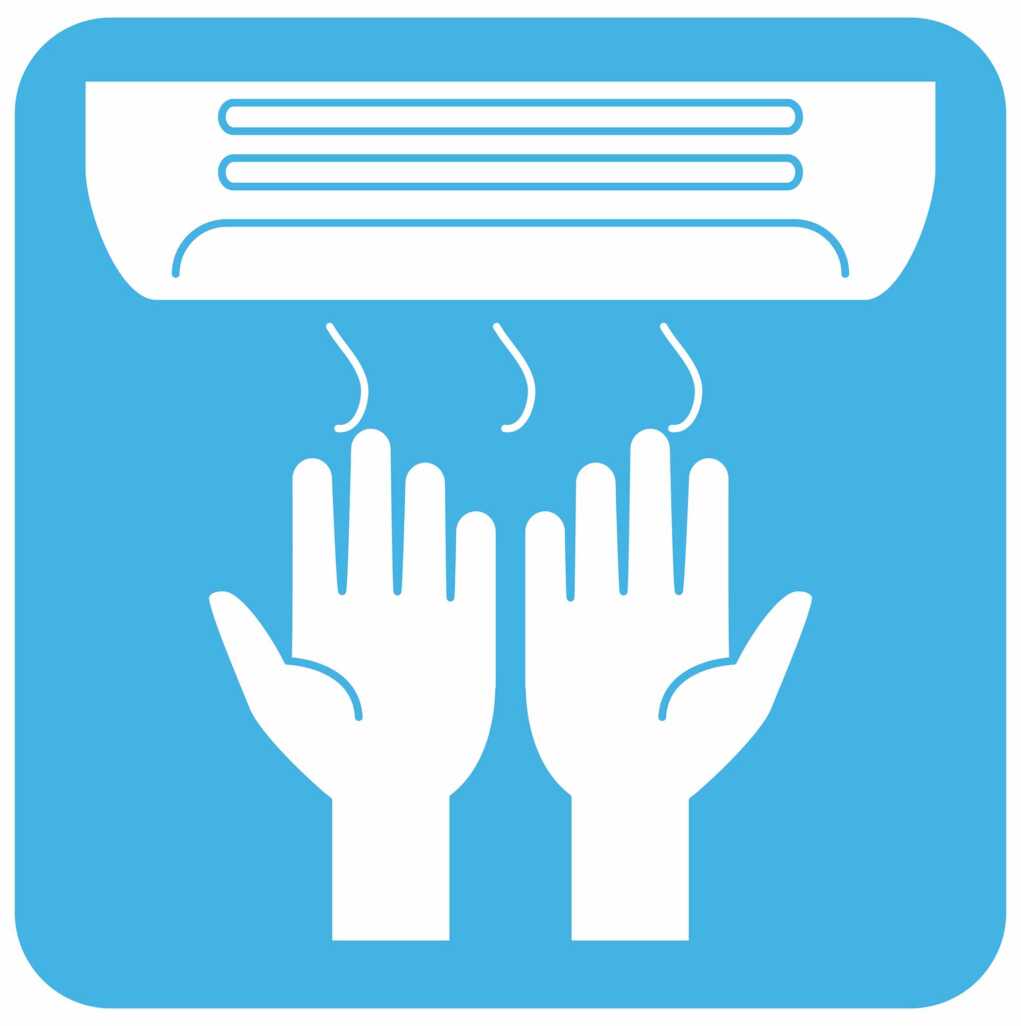
Some dryers spread germs instead of removing them.
One sure-fire way to keep flu and other viruses at bay is to wash your hands often and well.
But if you can, avoid high-speed jet air dryers in public restrooms. Research shows that they spread — rather than remove — germs. The same is true to a lesser extent for warm air dryers.
The clear winner: Good old-fashioned paper towels.
“We often say handwashing is the key to preventing the spread of illness,” says family medicine physician Daniel Allan, MD. “But wet hands increase the risk of transmitting bacteria, so drying is an equally important step in prevention.”
Importance Of Handwashing And Hand Drying
The healthcare and food industries are obsessed with hand hygiene. That’s because in a hospital, transmitting viruses and bacteria can mean life or death. And in a restaurant or on a cruise ship, foodborne illnesses like E. coli and coronavirus can make people severely and even critically ill.
Lots of research has focused on handwashing — and hand drying — techniques as a result.
Let’s separate fact from fiction when it comes to hand drying.
Myth: Hand Dryers Help Kill Germs
Fact: Hand dryers can spread viruses and bacteria
The airport. The mall. Your beauty salon. You may have noticed how many public buildings have switched to hand dryers in recent years. Yet researchers have found that mechanical hand dryers may essentially “undo” what handwashing does in the first place — get rid of germs.
In a small 2021 study, volunteers wore aprons while washing and drying their hands. Half of the participants used paper towels to dry their hands while the other half used a jet air dryer. The researchers then analyzed the aprons, the participants’ hands and the surfaces they touched afterward to see how viruses spread.
The results showed that the people who used hand dryers had more viruses on their hands and aprons than those who used paper towels. But it’s important to keep in mind that the experiment used high amounts of microbes that may not be found in an average environment and that the sample size was very small.
Still, these findings were similar to results from other studies, including a 2018 study that found that hand dryers can blow bacteria present in public bathrooms onto your hands.
While this doesn’t confirm that hand dryers can spread certain viruses, the World Health Organization (WHO) did make it clear that hand dryers can’t protect against the COVID-19 virus.
Myth: Jet Air Dryers Are Better Than Traditional Warm Air Dryers
Fact: Jet air dryers spread more microbes than warm air dryers
Could certain air dryers be worse than others? In a 2015 study, microbiologists aimed to find out by comparing jet air dryers to warm air dryers and paper towels.
Here’s what they found:
- The jet air dryer dispersed an average of 60 times more viruses than the warm air dryer and 1,300 times more than paper towels, at six different heights.
- The impact of the viral spread was greatest at 2.5 feet to 4.1 feet — which is about face-level for a small child.
- The jet air dryer dispersed 20 times more viruses than the warm air dryer and 190 times more virus than paper towels, at nine different distances.
The way each method works helps to explain the results. Jet air dryers force air out sideways at ultrahigh speeds, while warm air dryers work by evaporation. Paper towels absorb water. Essentially, both types of hand dryers spread microbes, but jet air dryers have been found to do it more aggressively.
Myth: Hand Dryers Are More Sanitary Than Paper Towels
Fact: Paper towels are the most hygienic
When you’re in a public restroom, remember that low-tech is sometimes better than high-tech and stick with paper towels. As the above studies have noted, opting for paper towels will keep more germs off your freshly cleaned hands than air dryers.
“Drying your hands with paper towels not only dries them faster, but the friction also dislodges bacteria to leave them cleaner,” notes Dr. Allan.
And those cloth towel dispensers? It’s best to avoid them. The patch of cloth at the end of the roll tends to get used over and over again. This transmits germs from hand to hand to hand.
The Best Way To Get Your Hands Really Clean
Handwashing is still one of the best ways to protect yourself against bacteria and disease.
The U.S. Centers for Disease Control and Prevention (CDC) recommends the following:
- Use warm or cold water. Wet your hands, then turn off the tap, then apply soap.
- Lather well, washing the backs of your hands, between your fingers and beneath your nails.
- Wash for at least 20 seconds — about as long as it takes to sing “Happy Birthday.”
- Rinse well under clean, running water.
- Dry hands with a clean towel or air dry.
A Last Resort: Hand Sanitizers
No matter where you go, it’s probably a good idea to carry around some hand sanitizer. If you’re in a public restroom that only has air dryers, you can try and cover your bases by sanitizing your hands after drying them.
Hand sanitizers are better than nothing, according to the CDC. But they won’t clean visible dirt or grease, they can’t kill all germs and they can’t remove all harmful chemicals. If hand sanitizers are your only option, make sure they are at least 60% alcohol.
Keeping your hands germ-free is an important part of staying healthy. Wash your hands before and after preparing and eating food, after blowing your nose or sneezing, and after using the bathroom. If you’re using a public restroom, your best bet is to skip the hand dryer as well.
Important Notice: This article was originally published at https://health.clevelandclinic.org where all credits are due.
Disclaimer
The watching, interacting, and participation of any kind with anything on this page does not constitute or initiate a doctor-patient relationship with Dr. Farrah™. None of the statements here have been evaluated by the Food and Drug Administration (FDA). The products of Dr. Farrah™ are not intended to diagnose, treat, cure, or prevent any disease. The information being provided should only be considered for education and entertainment purposes only. If you feel that anything you see or hear may be of value to you on this page or on any other medium of any kind associated with, showing, or quoting anything relating to Dr. Farrah™ in any way at any time, you are encouraged to and agree to consult with a licensed healthcare professional in your area to discuss it. If you feel that you’re having a healthcare emergency, seek medical attention immediately. The views expressed here are simply either the views and opinions of Dr. Farrah™ or others appearing and are protected under the first amendment.
Dr. Farrah™ is a highly experienced Licensed Medical Doctor certified in evidence-based clinical nutrition, not some enthusiast, formulator, or medium promoting the wild and unrestrained use of nutrition products for health issues without clinical experience and scientific evidence of therapeutic benefit. Dr. Farrah™ has personally and keenly studied everything she recommends, and more importantly, she’s closely observed the reactions and results in a clinical setting countless times over the course of her career involving the treatment of over 150,000 patients.
Dr. Farrah™ promotes evidence-based natural approaches to health, which means integrating her individual scientific and clinical expertise with the best available external clinical evidence from systematic research. By individual clinical expertise, I refer to the proficiency and judgment that individual clinicians acquire through clinical experience and clinical practice.
Dr. Farrah™ does not make any representation or warranties with respect to the accuracy, applicability, fitness, or completeness of any multimedia content provided. Dr. Farrah™ does not warrant the performance, effectiveness, or applicability of any sites listed, linked, or referenced to, in, or by any multimedia content.
To be clear, the multimedia content is not intended to be a substitute for professional medical advice, diagnosis, or treatment. Always seek the advice of your physician or other qualified health providers with any questions you may have regarding a medical condition. Never disregard professional medical advice or delay in seeking it because of something you have read or seen in any website, video, image, or media of any kind. Dr. Farrah™ hereby disclaims any and all liability to any party for any direct, indirect, implied, punitive, special, incidental, or other consequential damages arising directly or indirectly from any use of the content, which is provided as is, and without warranties.








